Publishing Talks: David Wilk interviews Hugh McGuire
May 1, 2011 by David
Filed under Ebooks and Digital Publishing, Publishing History, PublishingTalks, Technology, The Future
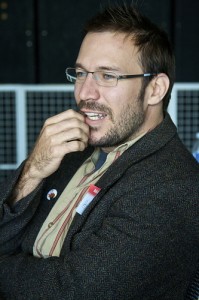 In this series of interviews, called Publishing Talks, I have been talking to book industry professionals and other smart people about the future of publishing, books, and culture. This is a period of disruption and change for all media businesses. We must wonder now, how will publishing evolve as our culture is affected by technology, climate change, population density, and the ebb and flow of civilization and economics?
In this series of interviews, called Publishing Talks, I have been talking to book industry professionals and other smart people about the future of publishing, books, and culture. This is a period of disruption and change for all media businesses. We must wonder now, how will publishing evolve as our culture is affected by technology, climate change, population density, and the ebb and flow of civilization and economics?
I hope these Publishing Talks conversations can help us understand the outlines of what is happening in the publishing industry, and how we might ourselves interact with and influence the future of publishing as it unfolds.
These interviews give people in and around the book business a chance to talk openly about ideas and concerns that are often only talked about “around the water cooler,” at industry conventions and events, and in emails between friends and they give people inside and outside the book industry a chance to hear first hand some of the most interesting and challenging thoughts, ideas and concepts being discussed by people in the book business.
Hugh McGuire is a serial digital entrepreneur. There’s a great story about him and an online interview at NextMontreal, in which the focus of the conversation is a company he started a few years ago called Book Oven, aiming to build an online book publishing platform. That particular venture did not meet expectations, but it’s a great story for anyone interested in digital publishing and start-up businesses in publishing (and resulted in a very cool tool called PressBooks, that “lets you and your team easily author and output books in multiple formats including: epub, Kindle, print-on-demand-ready PDF, HTML, and inDesign-ready XML.”)
Hugh is also the founder of the outstanding free audio book LibriVox, which currently features perhaps the largest catalog of audio books drawn from the public domain. It’s a great service and operates on open source principles. In addition to LibriVox, Hugh has also started and now runs a for-profit audio book business called Iambik, which shares many principles with LibriVox except in its profit goals, which of course drives a different business model.
What prompted me to contact Hugh now is the recent and terrific guest piece he wrote called What are Libraries For? for the outstanding blog In the Library with the Leadpipe (subtitled: The murder victim? Your library assumptions. Suspects? It could have been any of us.) This piece has so much great stuff in it (and is so well written and clear), that it’s a must-read for anyone interested in the future of publishing, books and readers (and In the Library is a great discovery too).
You may not agree with all of Hugh’s assumptions, nor his conclusions (I mostly do), but what he says will make you think hard about the digital future and what it will mean to libraries and every other institution in the book to reader supply chain. I’d be happy to hear from Writerscast listeners what you think of Hugh’s article after you read it. Comments are open.
Here’s the first graph of Hugh’s essay: “Ebooks will become the dominant form of casual reading for adults at some point in the future1. When this happens, community and public libraries will face a major existential crisis, because a fundamental (perhaps the fundamental) function of community libraries—lending print books—will no longer be a fundamental demand from the community. Libraries that do not adjust will find their services increasingly irrelevant to the populations they serve.”

Podcast: Play in new window | Download
Publishing Talks: David Wilk interviews Charles Alexander
March 28, 2011 by David
Filed under Ebooks and Digital Publishing, Publishing History, PublishingTalks, Technology, The Future
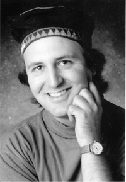 In this series of interviews, called Publishing Talks, I have been talking to book industry professionals and other smart people about the future of publishing, books, and culture. This is a period of disruption and change for all media businesses. We must wonder now, how will publishing evolve as our culture is affected by technology, climate change, population density, and the ebb and flow of civilization and economics?
In this series of interviews, called Publishing Talks, I have been talking to book industry professionals and other smart people about the future of publishing, books, and culture. This is a period of disruption and change for all media businesses. We must wonder now, how will publishing evolve as our culture is affected by technology, climate change, population density, and the ebb and flow of civilization and economics?
I hope these Publishing Talks conversations can help us understand the outlines of what is happening in the publishing industry, and how we might ourselves interact with and influence the future of publishing as it unfolds.
These interviews give people in and around the book business a chance to talk openly about ideas and concerns that are often only talked about “around the water cooler,” at industry conventions and events, and in emails between friends and they give people inside and outside the book industry a chance to hear first hand some of the most interesting and challenging thoughts, ideas and concepts being discussed by people in the book business.
Charles Alexander is the founder and prime mover behind Chax Press, a nonprofit publisher and studio. As he describes it on the website Chax “publishes writing that does not take things for granted — things like “what is a poem,””what is an author,” or “what does it mean to read?” Walt Whitman said, “Reading is a gymnast’s act.” We strive to make books that reward such exercise in stunning ways.”
Whether working with handset type, Vandercook proof press, carved wood blocks, linen threads and fine papers, or with computers, Chax Press books celebrate the changing shape of American poetry by presenting experimental works with humanist commitment. Chax also brings its work to the public in ways other than in books, sponsoring poetry readings, writers- and artists-in-residence, exhibitions, and more events that encourage a public investigation as to the nature and importance of contemporary poetry and book arts.
Chax Press was founded in 1984 in Tucson. More than 50 books have followed between then and the present, including several published during Chax’s three years (1993-96) in Minneapolis, where Alexander served as Executive Director of Minnesota Center for Book Arts.
In general, Chax Press publishes experimentalist works that share a strong humanist commitment. Chax Press chapbooks are published in small editions and mix desktop publishing technologies with hand bookbinding practices and, at times, fine art papers.
I’ve known Charles Alexander for many years and love the work he has done with Chax. I thought it would be extremely rewarding to talk to him about modern publishing and his vision of books and readers, especially now, when the current talk about digital publishing dominates our environment. Anyone who has set type, printed pages and made paper by hand for a living is certain to possess a valuable perspective on the literal relationship between word and eye that still is so important to the work of publishers in any environment. Charles and I had a great time talking about Chax and its wonderful work.
The Chax website is well worth a visit, as is Charles’ blog, and if you find yourself in Tucson, go see the Chax Press facility, which is a wonderful and central hub of the Tucson poetry and arts community.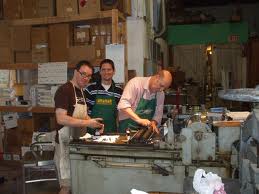

Podcast: Play in new window | Download
Publishing Talks: David Wilk interviews Phil Ollila
March 9, 2011 by David
Filed under Ebooks and Digital Publishing, Publishing History, PublishingTalks, Technology, The Future
 In this series of interviews, called Publishing Talks, I have been talking to book industry professionals and other smart people about the future of publishing, books, and culture. This is a period of disruption and change for all media businesses. We must wonder now, how will publishing evolve as our culture is affected by technology, climate change, population density, and the ebb and flow of civilization and economics?
In this series of interviews, called Publishing Talks, I have been talking to book industry professionals and other smart people about the future of publishing, books, and culture. This is a period of disruption and change for all media businesses. We must wonder now, how will publishing evolve as our culture is affected by technology, climate change, population density, and the ebb and flow of civilization and economics?
I hope these Publishing Talks conversations can help us understand the outlines of what is happening in the publishing industry, and how we might ourselves interact with and influence the future of publishing as it unfolds.
These interviews give people in and around the book business a chance to talk openly about ideas and concerns that are often only talked about “around the water cooler,” at industry conventions and events, and in emails between friends and they give people inside and outside the book industry a chance to hear first hand some of the most interesting and challenging thoughts, ideas and concepts being discussed by people in the book business.
Philip Ollila (widely known as Phil in the book industry) is the Chief Content Officer of Ingram Content Group Inc., one of the largest distributors of book content and providers of digital printing in the North American book industry. Phil is responsible for Ingram Content Group’s publisher facing business, and has been instrumental in leading the transformation of Ingram from a traditional wholesale service provider, into what is now a fully integrated solutions company for clients. Ingram combines wholesale distribution, print-on-demand, digital distribution, inventory management and comprehensive worldwide services for both physical and digital content.
Phil leads a number of Ingram business units including wholesale merchandising, Lightning Source, Ingram Publisher Services and digital distribution through CoreSource® and also heads up Ingram Content Group marketing. Before joining Ingram, where he has held several leadership positions, he was Vice President of Marketing and Merchandising for Borders.
Anyone in the book business, and many people outside it know about Ingram. It is one of the two large book wholesalers transitioning from a key role in the physical supply chain between publishers and retailers. Perhaps earlier than any other large company in the industry, Ingram had the foresight to invest in a range of services that would enhance their offerings to both their suppliers (mainly publishers) and their customers (bookstores, libraries and many other retailers). In many ways, it is only the two large former traditional wholesalers, Ingram and its competitor Baker & Taylor that have the unique perspective and ability to act as really powerful and influential transformative agencies as the book business evolves into a combination of print and digital products.
Phil Ollila is therefore now in a key role at a tremendously interesting and fast moving business that possesses a great deal of information valuable to publishers and to anyone interested in how publishing, books and readers will interact in the future, both near term and much, much farther into the future.
Podcast: Play in new window | Download
Publishing Talks: David Wilk interviews Mike Shatzkin
February 28, 2011 by David
Filed under Ebooks and Digital Publishing, Publishing History, PublishingTalks, Technology, The Future
 In this series of interviews, called Publishing Talks, I have been talking to book industry professionals and other smart people about the future of publishing, books, and culture. This is a period of disruption and change for all media businesses. We must wonder now, how will publishing evolve as our culture is affected by technology, climate change, population density, and the ebb and flow of civilization and economics?
In this series of interviews, called Publishing Talks, I have been talking to book industry professionals and other smart people about the future of publishing, books, and culture. This is a period of disruption and change for all media businesses. We must wonder now, how will publishing evolve as our culture is affected by technology, climate change, population density, and the ebb and flow of civilization and economics?
I hope these Publishing Talks conversations can help us understand the outlines of what is happening in the publishing industry, and how we might ourselves interact with and influence the future of publishing as it unfolds.
These interviews give people in and around the book business a chance to talk openly about ideas and concerns that are often only talked about “around the water cooler,” at industry conventions and events, and in emails between friends and they give people inside and outside the book industry a chance to hear first hand some of the most interesting and challenging thoughts, ideas and concepts being discussed by people in the book business.
Mike Shatzkin, is the founder and operator of a well known book industry consulting business called The Idea Logical Company. He’s also a blogger extraordinaire who writes incisively about issues in the book industry at The Shatzkin Files and who is never afraid to make public predictions about the future of books and the book business he knows so well, having essentially grown up in the business from an early age. He is an organizer of conferences, and a frequent speaker at publishing industry gatherings large and small.
The description of Idea Logical on its website sums up Mike’s role pretty succinctly: “The Idea Logical Company consults to book publishers and their trading partners about the changes engendered by digital transformation to every component of the value chain.” Mike has spent thirty years addressing all sorts of issues and problems for publishing and retailing clients of all sizes. In recent years, his work has focused on the changes created for the publishing industry by a variety of new and emerging digital technologies. He was an early advocate of digital publishing, and also established the concept of “verticality” or subject specific publishing as a way to organize publishing around digital technologies.
Beyond his interest and expertise in publishing, Mike is also a writer and an active entrepreneur. In this interview, we did not discuss any of his baseball related writing, editing, publishing and website development – if we had, it’s likely we would have used up all our time talking about our mutually shared passion, a subject in which Mike has also had an entire career simultaneously with his consulting work and constant thinking and analysis about books, publishers, readers and the business that serves them.
In my opinion, Mike talks just as clearly and intelligently, if not more so, than he writes, which given his writing talents, is saying alot. We certainly had a lot of fun in this conversation, which I think will be useful and interesting to anyone interested in the future of books and reading. As Mike says in his latest blog post: “Sometimes, and it would seem quite often these days, the future comes faster than you expected it.”
Podcast: Play in new window | Download
Publishing Talks: David Wilk interviews Don Leeper
February 14, 2011 by David
Filed under Ebooks and Digital Publishing, PublishingTalks, Technology, The Future
 In this series of interviews, called Publishing Talks, I have been talking to book industry professionals and other smart people about the future of publishing, books, and culture. This is a period of disruption and change for all media businesses. We must wonder now, how will publishing evolve as our culture is affected by technology, climate change, population density, and the ebb and flow of civilization and economics?
In this series of interviews, called Publishing Talks, I have been talking to book industry professionals and other smart people about the future of publishing, books, and culture. This is a period of disruption and change for all media businesses. We must wonder now, how will publishing evolve as our culture is affected by technology, climate change, population density, and the ebb and flow of civilization and economics?
I believe these Publishing Talks conversations can help us understand the outlines of what is happening in the publishing industry, and how we might ourselves interact with and influence the future of publishing as it unfolds.
These interviews give people in and around the book business a chance to talk openly about ideas and concerns that are often only talked about “around the water cooler,” at industry conventions and events, and in emails between friends and they give people inside and outside the book industry a chance to hear first hand some of the most interesting and challenging thoughts, ideas and concepts being discussed by people in the book business.
Don Leeper is the founder of Bookmobile, based outside of Minneapolis, providing outsourced production services to independent and academic publishers all over the world. The company was founded as Stanton Publication Services in 1982, and has grown significantly over the years, now offering not only pre-press services for print books, as well as growing digital printing business, an expanding range of digital book production services, including ebooks and apps, and even an off-shoot business for book distribution. OR Books has hired Bookmobile to provide all of its production services, as some other publishers have also done.
What attracted my attention most recently to this company is their announcement of Ampersand, an iPad app created to preserve the layout and pagination of poetry (and of course any other book for which specific line and page layouts are critical). It’s been one of the raps on ebooks that poetry essentially does not work in the Kindle (mobi) and other popular reading devices or platforms that use ePub as the format for their content. Ampersand enables publishers (and poets who want to publish their own work) to preserve complex page compositions easily and as an app provides both a reading environment and a sales structure on the iPad (and presumably the iPhone and iPod as well).
Clearly Leeper and his crew are creative and working hard to provide a wide range of needed services for independent and academic publishers, for whom the fast changing digital environment presents significant challenges. He’s also a great example of someone who has been agile in moving from traditional publishing workflows into new digital realms while retaining a strong commitment to the important values of design and interface that will always be necessary for writers, publishers and readers, whatever the devices or delivery systems they use for reading.
Ampersand shows alot of promise for many independent publishers of poetry and other types of work where the actual page concept still matters, especially because cost of production matters most for small circulation content (there are certainly other PDF based e-book publishing methods available, but most are more costly and not highly automated). A few poetry publishers are on board with Bookmobile to pilot the Ampersand project, and we’ll be interested to see some finished work in coming months.
In this interview, Don and I had a wide ranging and lively conversation about digital publishing, poetry, and the future of print and ebooks.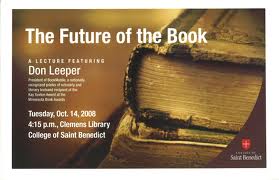
![]()
Podcast: Play in new window | Download
Publishing Talks: David Wilk interviews Allee Willis
December 28, 2010 by David
Filed under PublishingTalks, Technology, The Future
 In this series of interviews, called Publishing Talks, I have been talking to book industry professionals and other smart people about the future of publishing, books, and culture. This is a period of disruption and change for all media businesses. We must wonder now, how will publishing evolve as our culture is affected by technology, climate change, population density, and the ebb and flow of civilization and economics?
In this series of interviews, called Publishing Talks, I have been talking to book industry professionals and other smart people about the future of publishing, books, and culture. This is a period of disruption and change for all media businesses. We must wonder now, how will publishing evolve as our culture is affected by technology, climate change, population density, and the ebb and flow of civilization and economics?
I hope these Publishing Talks conversations will help us understand the outlines of what is happening, and how we might ourselves interact with and influence the future of publishing as it unfolds.
These interviews give people in and around the book business a chance to talk openly about ideas and concerns that are often only talked about “around the water cooler,” at industry conventions and events, and in emails between friends and they give people inside and outside the book industry a chance to hear first hand some of the most interesting and challenging thoughts, ideas and concepts being discussed by people in the book business.
Allee Willis is one of my all-time favorite people. She is best known as a spectacular and hugely successful songwriter; her songs for Earth, Wind and Fire and the Pointer Sisters were giant hits, she wrote the theme song for “Friends,” the music for the Oprah Winfrey produced Broadway musical production of “The Color Purple, collaborated with the web sensation Pomplamoose (Jungle Music), and as of the date of this posting, her song “I’m Here” was sung by Jennifer Hudson for Oprah Winfrey’s Kennedy Center Honor Award. But all of this musical success notwithstanding, as she herself says, Allee is “a one-woman creative think-tank. A multi-disciplinary artist and visionary thinker whose range of imagination and productivity knows no bounds, her success exuberantly defies categorization-‘unique’ pales as a descriptor.” You have to visit her website to begin to get an idea of what a creative powerhouse she is. Her Allee Willis Museum of Kitsch is not to be missed. She’s constantly creating, integrating music, art, video, multi-media technology and lifestyle via a series of work which she co-composes, sings, plays, produces, draws, animates, directs, designs web worlds for and stars in. The first release, “Allee Willis Presents Bubbles & Cheesecake “It’s A Woman Thang”-part of a 6-song collaboration with singer-songwriter Holly Palmer (aka Cheesecake) was selected as Official Honoree in the 2008 Webby Awards, and won three 2008 W3 Awards. Her second video, “Allee Willis Presents Bubbles & Cheesecake “Editing Is Cool” was also ‘featured’ on YouTube. At one point, Willis’ 2009 video “Hey Jerrie,” co-starring 91-year-old female drummer on an oxygen tank Jerrie Thill, was the 12th most popular video in the world on YouTube.
I wanted to talk to Allee mainly because she has been working with the internet in her work almost since the ‘web went public – as she points out, the ‘web itself is her medium. She is the ultimate social being, her work itself is social art, her medium is her life. Anyone working in an artistic discipline today can learn from what she knows and how she conducts herself as an artist. I loved talking to Allee about her work and what she knows – which is a tremendous amount. And now I am addicted to her website too. Writers and publishers, please pay attention to what she has to say: art is social! books are bait!
Podcast: Play in new window | Download
Publishing Talks: David Wilk interviews Andrew Steeves
November 11, 2010 by David
Filed under PublishingTalks, Technology, The Future
 In this series of interviews, called Publishing Talks, I have been talking to book industry professionals and other smart people about the future of publishing, books, and culture. This is a period of disruption and change for all media businesses. We must wonder now, how will publishing evolve as our culture is affected by technology, climate change, population density, and the ebb and flow of civilization and economics?
In this series of interviews, called Publishing Talks, I have been talking to book industry professionals and other smart people about the future of publishing, books, and culture. This is a period of disruption and change for all media businesses. We must wonder now, how will publishing evolve as our culture is affected by technology, climate change, population density, and the ebb and flow of civilization and economics?
I hope these Publishing Talks conversations will help us understand the outlines of what is happening, and how we might ourselves interact with and influence the future of publishing as it unfolds.
These interviews give people in and around the book business a chance to talk openly about ideas and concerns that are often only talked about “around the water cooler,” at industry conventions and events, and in emails between friends and they give people inside and outside the book industry a chance to hear first hand some of the most interesting and challenging thoughts, ideas and concepts being discussed by people in the book business.
Andrew Steeves and his partner Gary Dunfield, founded Gaspereau Press in Nova Scotia in 1997, starting out, as many have done, with a literary quarterly and moving into publishing books, three in their first year, eight by 2000 when they moved to the small town of Kentfield. In Canada, there is a long tradition of government funding of the arts, including literature, through support grants to publishers of all sizes and kinds. Bordering the giant culture machine to the south, this is an important mechanism to keep in place a vibrant and local Canadian literary scene. Gaspereau publishes in the tradition of the long running Coach House Press (founded by Stan Bevington in 1965 and still going strong) and the wonderful Montreal based Vehicule Press, among other highly successful independent Canadian literary presses.
But there’s much more going on here than a well run independent literary press putting out a small number of excellent books each year. Gaspereau is also, significantly, a printer, not only of their own books, but for commercial and private customers as well. The operation maintains a great deal of equipment too, from hand set metal type printed on hand cranked proof presses, to semi-modern offset presses that have alot of miles on them.
I’ve been deeply interested in and have admired Canadian publishing and writing for a long time. But I only heard about Gaspereau fairly recently, when reports started circulating about one of their new books, Johanna Skibsrud’s The Sentimentalists. was nominated for the major Canadian literary prize, the ScotiaBank Giller award. I looked up the Gaspereau site, and was immediately taken with their approach to publishing and book design, and contacted Andrew Steeves to talk about the work of the Gaspereau and its fierce commitment to publishing books by hand. We had a great talk, and that is the interview presented here.
If course a couple of days later, the big news hit – The Sentimentalists, perhaps a dark horse previously, won the Giller for its 30 year old author and her publisher. Now in the midst of a great deal of celebrating and joy, Gaspereau is trying to keep up with the almost unbelievable demand for the book that the award has spurred. Canada’s National Post headlined “Literary community weighs in on Gaspereau’s Giller dilemma.” There’s a huge uproar in Canada and alot of ire directed at Gaspereau for not being able to instantly print the thousands of books needed by stores to meet demand. Author Skibsrud is on vacation in Istanbul happily celebrating her good fortune (a $50,000 CN prize comes with the recognition) so we don’t know what she thinks about any of this.
Andrew and Gary do not want to sell the book to a bigger publisher to meet demand. They want to maintain it as a Gaspereau book. Personally I am on their side, but I understand the difficulty for everyone involved, including the author, and of course the many readers out there who want to read the book now. On the one hand, selling the book off solves lots of problems, makes readers happy, puts many thousands of dollars in the hands of the author and Gaspereau, but loses them an author they have discovered and takes them out of the publishing equation, just because they are small and committed to high quality, hands on publishing.
I’d love to hear from listeners on this question: should Gaspereau stay its course, remain committed to its mission, and refuse to sell off The Sentimentalists to another publisher? Or should they accept that the demand of mass culture is too great for an artisanal press, and maybe keep their own edition in print as the original, and license a lesser trade edition to a larger house that is built for this sort of publishing?
In any case, please listen to Andrew Steeves talking about Gaspereau, its mission, history and vision for the future. And keep in mind that when we talked, he had no idea what was about to happen to his life. And by the way, The Sentimentalists sounds like a truly wonderful novel, and like thousands of readers north of our border, I want to read it as soon as possible! I’m guessing I might be waiting awhile…
And by the way, The Sentimentalists sounds like a truly wonderful novel, and like thousands of readers north of our border, I want to read it as soon as possible! I’m guessing I might be waiting awhile…
Podcast: Play in new window | Download
Publishing Talks: David Wilk interviews Liza Daly
November 5, 2010 by David
Filed under Ebooks and Digital Publishing, PublishingTalks, Technology, The Future
 In this series of interviews, called Publishing Talks, I have been talking to book industry professionals and other smart people about the future of publishing, books, and culture. This is a period of disruption and change for all media businesses. We must wonder now, how will publishing evolve as our culture is affected by technology, climate change, population density, and the ebb and flow of civilization and economics?
In this series of interviews, called Publishing Talks, I have been talking to book industry professionals and other smart people about the future of publishing, books, and culture. This is a period of disruption and change for all media businesses. We must wonder now, how will publishing evolve as our culture is affected by technology, climate change, population density, and the ebb and flow of civilization and economics?
I hope these Publishing Talks conversations will help us understand the outlines of what is happening, and how we might ourselves interact with and influence the future of publishing as it unfolds.
These interviews give people in and around the book business a chance to talk openly about ideas and concerns that are often only talked about “around the water cooler,” at industry conventions and events, and in emails between friends and they give people inside and outside the book industry a chance to hear first hand some of the most interesting and challenging thoughts, ideas and concepts being discussed by people in the book business.
Liza Daly and her partner Keith Fahlgren work together as ThreePress Consulting, providing “expert consulting services and software engineering in digital publishing.” Liza’s name comes up constantly in discussions about ebooks and the emerging technology of publishing. Recently I’ve become interested in how HTML5 operates, as this new standard appears to have a great deal of potential use for handling online display and consumption of digital publishing in a web browser environment and elsewhere. Liza created Bookworm as a free platform for reading ePub format ebooks online and now with Keith, she has developed Ibis Reader, which enables reading ebooks on computers and devices without having to download ebook files or even understand how ebook files and devices work (and Ibis is written in HTML5).
In addition Liza and Keith are active in the open source technology community and are strong advocates for experimentation, agile development, and innovation in publishing. In April of 2010, Liza was elected to the IDPF Board of Directors. Both Keith and Liza are members of various IDPF EPUB Working Groups, including the EPUB 3.0 Working Group. Liza was a member of the advisory board for the Web 2.0 Expo NYC conference in 2008 and 2009, and was also on the board for O’Reilly’s digital publishing conference, Tools of Change 2009-2011.
I wanted to talk to Liza to better understand the emerging landscape of ebooks and e-reading as she sees it from her perspective. She is so deeply involved in new technologies and also has a terrific understanding of use and useability, which of course are critical for the future of digital publishing. I’ve used Ibis Reader now and it works really well. What comes next will be very interesting to see and hopefully this talk with Liza will be useful to listeners who are interested, as I am, in how new technologies will create opportunities for publishers, writers and readers in the near future. It’s critical that we understand how we interact with new software, how its use affects our comprehension of information and ideas, and how we can in turn influence the emerging future we are about to inhabit. Since Liza is one of the proverbial “smartest people in the room” I can’t think of anyone better from which to learn.
Podcast: Play in new window | Download
Publishing Talks: David Wilk interviews Andy Campbell
October 8, 2010 by David
Filed under Ebooks and Digital Publishing, PublishingTalks, Technology, The Future
 In this series of interviews, called Publishing Talks, I have been talking to book industry professionals and other smart people about the future of publishing, books, and culture. This is a period of disruption and change for all media businesses. We must wonder now, how will publishing evolve as our culture is affected by technology, climate change, population density, and the ebb and flow of civilization and economics?
In this series of interviews, called Publishing Talks, I have been talking to book industry professionals and other smart people about the future of publishing, books, and culture. This is a period of disruption and change for all media businesses. We must wonder now, how will publishing evolve as our culture is affected by technology, climate change, population density, and the ebb and flow of civilization and economics?
I hope these Publishing Talks conversations will help us understand the outlines of what is happening, and how we might ourselves interact with and influence the future of publishing as it unfolds.
These interviews give people in and around the book business a chance to talk openly about ideas and concerns that are often only talked about “around the water cooler,” at industry conventions and events, and in emails between friends and they give people inside and outside the book industry a chance to hear first hand some of the most interesting and challenging thoughts, ideas and concepts being discussed by people in the book business.
When I recently accidentally discovered the work of UK writer Andy Campbell, I was completely blown away. First because the work is so good, imaginative, creative that makes full use of the digital environment to tell stories in a thoroughly new way. But second, simply because I was so surprised that he had been doing this work for so long, and I had never learned of it before now. It’s just proof that the creative world we inhabit is so vast and full of creative individuals, fragmented and as full of stars as the night sky. And it is great fun to find new kinds of writers and writing, and learn so much from their own experiences.
Andy Campbell is a digital writer who has been working at the forefront of digital fiction since 1994. He is the author of Dreaming Methods, a website described by the UK’s Times Educational Supplement as “One of the most impressive purveyors of the new art of internet reading… a distinctive voice that couldn’t be replicated in print.” He is also co-director of One to One Productions Ltd, creating and facilitating multimedia projects for charities, arts organizations and others.
Andy is great fun to talk to, has some valuable insights and thoughts about the emergence and future of digital storytelling, and I hope this talk will gain him some new readers for his really exciting story telling. I think his work represents a profound shift in the way our culture imagines and tells its stories. (below a small screenshot from Nightingales Playground – “a young man attends a school reunion only to discover none of his old friends remember the same things he does”). Do visit Dreaming Methods, it is well worth the time to explore (and support this digital innovator by subscribing).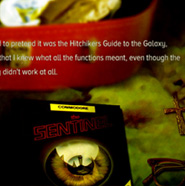
Podcast: Play in new window | Download
Publishing Talks: David Wilk interviews Ron Martinez
September 27, 2010 by David
Filed under Ebooks and Digital Publishing, PublishingTalks, Technology, The Future
 In this series of interviews, called Publishing Talks, I have been talking to book industry professionals and other smart people about the future of publishing, books, and culture. This is a period of disruption and change for all media businesses. We must wonder now, how will publishing evolve as our culture is affected by technology, climate change, population density, and the ebb and flow of civilization and economics?
In this series of interviews, called Publishing Talks, I have been talking to book industry professionals and other smart people about the future of publishing, books, and culture. This is a period of disruption and change for all media businesses. We must wonder now, how will publishing evolve as our culture is affected by technology, climate change, population density, and the ebb and flow of civilization and economics?
I hope these Publishing Talks conversations will help us understand the outlines of what is happening, and how we might ourselves interact with and influence the future of publishing as it unfolds.
These interviews give people in and around the book business a chance to talk openly about ideas and concerns that are often only talked about “around the water cooler,” at industry conventions and events, and in emails between friends and they give people inside and outside the book industry a chance to hear first hand some of the most interesting and challenging thoughts, ideas and concepts being discussed by people in the book business.
Ron Martinez, is Managing Partner and Co-Founder of Invention Arts. His primary focus is on [aerbook], a web-based publishing and marketing platform that helps books and potential readers find one another on the social web (www.aerbook.com). Ron is a prolific inventor, with close to a hundred and fifty issued patents and patent applications currently in flight. He brings a combination of, technical, creative, intellectual property development and management, design, and strategic and operational business experience to his work at Invention Arts, and finds that his initial interest in computing as an expressive medium continues to define his agenda.
His introduction to the medium was in the mid-80’s, when he was an aspiring novelist in New York, writing YA adventure books, contributing to humor anthologies, writing comics for Heavy Metal and other publications–anything to put food on the table. A book packager asked him to adapt an Arthur C. Clarke novel, Rendezvous with Rama, to graphic adventure format, perhaps the first major author’s works to be so adapted. Taken with the expressive possibilities of the medium, Ron taught himself to program software and built an interactive fiction system, and went on to use that and enhancements to it, as well as entirely new systems, to write interactive fiction, original murder mysteries, political simulations, and other titles for publishers like Simon & Schuster, Spinnaker, Philips Interactive Media, Electronic Arts, and others. By the mid-90’s he was deeply interested in the design of story-rich, massively multiplayer online games. His game 10Six was one of the first of these, a social/tribal million player game published and operated by Sega. (Though built in the late 90’s, it continues to thrive as an indie game at ProjectVisitor.com. 10six introduced ownable, transactable virtual goods for the first time, a technology Ron was awarded a foundational patent for in 2001. Virtual goods models have since emerged as a dominant form of commerce for social networks and social games.
Prior to his current work at Invention Arts, Ron worked for a number of years as Vice President, Intellectual Property Innovation for Yahoo! There he designed and built the IP Innovation function which over a four year period delivered high volume targeted, patentable IP and productizable innovation. He also initiated Yahoo!’s content IP asset management and operations program, implementing a global, real-time rights infrastructure called Rights Engine.
His interests include invention techniques; the evolution of books and the current reimplementation of the publishing industry, intellectual property strategy; content rights; content IP and social distribution; electronic payments; virtual property; online payments; networked games; educational software; social media; social media advertising and marketing; social media monetization; mobile media; media metadata; media sharing and reuse; media remixing; and distributed media production.
It was from Ron’s announcement of Aerbook that I learned of his work. I was very excited as soon as I began exploring this project, because it launched just as I have been thinking about the implications of publishing as a social endeavor in the digital universe. Aerbook in fact is created around the notion of book as a multi-channel conversation between writers and readers, and I think it demonstrates concretely how powerfully publishing can be re-imagined. Ron’s experience as a writer who has mastered the skills and tools of software development and storytelling in a digital environment also brings forward the changes in how writers can work in this new environment. I hope you will find this discussion as interesting and thought provoking as it was for me talking to Ron Martinez. I think we are just now seeing the true beginnings of a “modern” form of publishing that will in fact expand the reach of writers and change their relationships with readers for the good of all.
Podcast: Play in new window | Download
